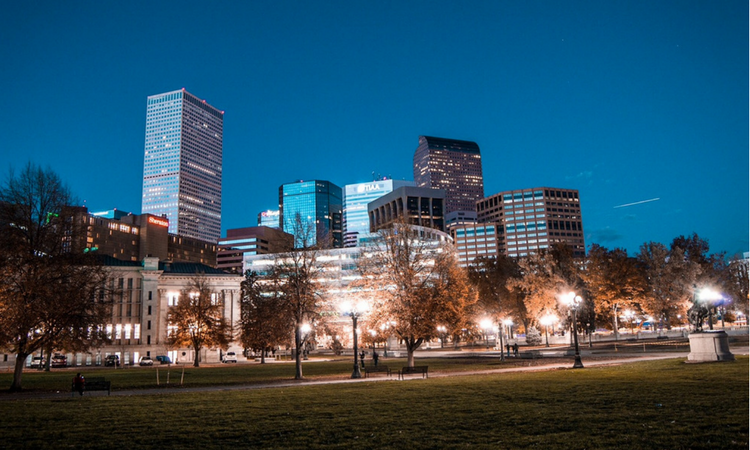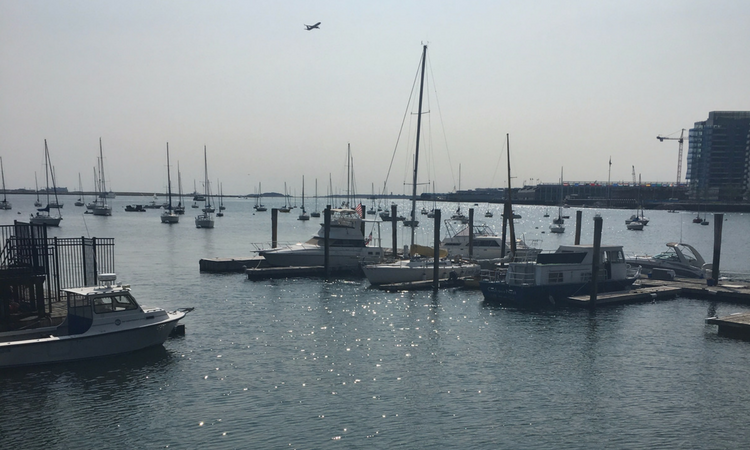
Downtown Denver
Denver. There’s no place like home.
Jack Kerouac’s novel, On the Road, was one of those books that captured the anarchic zeitgeist of the late ’60s as well as any. Of course, I fell in love with it in high school.
The crazy hitchhiking around the “immense triangular arc from New York to Mexico City to San Francisco.” The dope. The booze. The sex-tame by today’s standards, true-but a revealing foretaste of the depths to which the culture could, and has, sunk. But, I have to admit, the general cussedness of the book no doubt helped inspire what became the anti-war fervor of the hippies.
But the best part for me? A good deal of the story was set in the dim, narrow alleys and dive bars of downtown Denver. Larimer Street. Wazee Street. Kerouac was there long before the terms “gentrified” and “Lodo” had even been dreamed up. And I knew, even if only from a safe, suburban distance, those spooky environs from the time I was a kid since Denver is my home town. So, hey, even a cow town could turn out a famous writer. Perhaps there was hope for me.
Our recent trip to Cape Cod and out to Province Town brought to memory the book that Kerouac had so famously written on a continuous scroll of paper. I can hear you asking, “Fine. But, what’s the connection?”
Good question. Inspired by my then recent reading of Kerouac’s book, I got “on the road” myself during the last few weeks of the summer of 1970 and hitchhiked from Denver to Province Town, Massachusetts. And back.
In retrospect, one of the most remarkable things about the journey was that my mom volunteered to kick start the trip by driving me the first few miles out of town up I-76 toward the northeast corner of Colorado, where I planned to catch I-80 and go on to the east coast. If my son had proposed such a scheme to my wife in this day of perceived murder and mayhem, she would have probably locked him in his room. And fed him through the key hole for the duration of the summer. But for my mom, a child of the Depression, hitchhiking was something she had probably done herself.
Going in, let’s understand, that I’m talking about a trip that happened 45 years ago. And that I have gotten to the age where I can hide my own Easter eggs. So, this account is, of necessity, impressionist. Not a documentary. Nonetheless, there are some things that stand out even at this distance.
Early on, I lucked out and got picked up by a heavy set, youngish traveling salesman who took me all the way to Chicago in a boxy Volvo station wagon. It didn’t take much to impress me. I’d never been east of Denver before, and I remember thinking to myself, “With every passing mile, I’m seeing something I’ve never seen before.” Not exactly what you’d call “deep thinking.”
But corn fields that stretched to infinity and dingy gas station bathrooms at interstate off ramps had a short shelf life in the “romance of the road” department. Even for a rube like me.
Small towns used to punctuate and leaven long cross country drives on two lane highways like Route 66. Their’s was a symbiotic relationship: the towns serviced the passing motorists with cafe food, gas and a place to rest at motels with flashing neon “vacancy” signs. The passing motorists helped fuel small town economies where real life existed: homes where kitchen windows glowed at night, schools, little parks, church steeples, small businesses on the main street that, at the city limits, morphed into the highway that led to the next town.
The Interstate system, in the relentless pursuit of speed, efficiency, and, I’ll grant you, safety, severed that connection. Now, those small towns merit, at best, no more than an anonymous arrow at the end of an exit ramp. One of them, “Honey Town,” for some reason, sticks in my memory from the trip; it’s probably shrunk to a shadow of its former self by now. The Interstates did their damnedest to cut the heart out of rural America.
Late that first night, the Volvo pulled off I-80 at a rest stop. “What’s up?” I asked the driver, surfacing from a profound slumber. “Where are we?”
“Somewhere in Iowa,” he said, rubbing his neck. “I need to take to get some sleep.”
Cicadas kept up a relentless din in the muggy air that wrapped me like a sodden blanket as I got out of the car and stretched. “It gets cold in the Rockies when the sun goes down,” I thought to myself, “does it even cool off here when it gets dark?” Big bugs flew lazy circles around the mercury vapor lights that burned overhead. They bleached the color from the few cars in the rest area. And cast stark shadows across the parking lot. I slept on a concrete picnic table with nothing between me and it but my thin foam backpacking pad.
The next day we hit Chicago, where my driver lived with his mother. He invited me to get cleaned up, have dinner, and spend the night. I was grateful, but it must have been an awkward meal among strangers around that dinner table. I wonder what the guy’s mom said when he told her a hitchhiker was going to be a guest in her home.
The next day, as we drove to his job in the Loop, he bought me a ticket to a matinee showing of Hair. Of course, I’d heard of it-especially the notorious, 10 second nude scene. So my prurient instincts were quivering as I walked under the gaudy marquee and into the old shoebox of a theater. At that point in my life, I was an odd combination of prudish recklessness; when the lights went down, I watched with nervous anticipation. But from my vantage point toward the back of the balcony, I only saw enough to know that that I could say “Yes” if someone asked me if I had seen the “nude scene.”
By the next evening, I made it to South Bend and an exit near Notre Dame University. It was raining and the dark was closing in rapidly. The traffic was sparse and what little there was was going by so fast that it must have been nearly impossible to see a huddled figure in a dark poncho with his thumb out by the side of the road. I didn’t catch a ride till the next morning; talk about the longest night.
In Pennsylvania, I took a detour to visit the Gettysburg battle field. I was fortunate to be picked up by a family of Southerners-although I didn’t appreciate it at the time. From the perspective of the “Lost Cause,” a couple and their two young sons recounted the exploits of Picket’s Charge for me near where Confederate cannons were aimed at the Copse of Trees. When I thought of the withering shell fire, the Copse looked infinitely far away. For many of the young men who started across that field, it was.
This is yet another detour, but indulge me. For a nation that takes such pride in our having seceded from the British Empire in our War of Independence, the Civil Was is a strange chapter in our history. If it was a good thing for the 13 Colonies to strike out on their own, why is it a good thing that we fought a war that killed more Americans than all our other wars combined to prevent the 11 states of the Confederacy from doing the very same thing?
It was as if the South were an unhappy wife who sued for divorce. In response, the North, her husband, beats her until she changes her mind. The difference between the Revolutionary and Civil wars? The wife, the Colonies, won the former conflict against her husband, the British Empire. And the wife, the South, lost the latter. It’s remarkable how much that can be forgotten about the course of human events in a mere four score and seven years.
Of course, the Civil War it is now popularly-and politically correctly-seen as a war to free the slaves. But that is not how Abraham Lincoln saw it-at least until he needed something to rally a Union that was weary of loosing bloody battle after bloody battle to the Rebels. Until then, it was strictly a conflict, in Lincoln’s words, “To save the Union.” Slavery was entirely secondary.
If you are interested in a bracing alternative to the monotonous fare of Lincoln hagiographies that publishers churn out, take a look at the The Real Lincoln: A New Look at Abraham Lincoln, His Agenda, and an Unnecessary War by Thomas DiLorenzo. While DiLorenzo and his book have their critics, you should read it before the PC crowd consigns it to the memory hole. Just as you should tour the Gettysburg battle field before the same crowd effaces the many Confederate monuments there. But don’t wait too long-they’re trying, even as you read.
It was mid-afternoon by the time we were done reliving the scenes of those terrible few days. I thanked my tour guides for their Southern hospitality, bid them a good evening and then took in the 360° painting of battle at the Cyclorama. When I finished there, the sun was going down beyond the split rail fence that defined the edge of the battlefield. No doubt in violation of many rules and regulations, I climbed over the fence when I judged no-one was looking and spread my bag in a patch of high grass. And slept soundly with the ghosts that haunt the ground that was the high-water mark of the Confederacy.
Although the trip from there to Province Town is largely a blur, a few things stand out. Mostly the generosity of strangers. Another guy, in the Pennsylvania Dutch Country, invited me sit down to dinner with his wife and kids. Great, hospitable people. I hope I had the presence of mind to tell them that I have ancestors that had a land grant from William Penn.
I next went to Princeton, New Jersey where I free loaded off a college friend named Ritchie and his family. Free loaded so long, in fact, that Ritchie had to invite me to leave (at his parents’ urging, no doubt). The romance of the road was wearing thin; a soft bed and clean sheets weren’t so bad after all.
My next stop was New York City where I got a room in a high rise YMCA. Talk about spooky for a wet-behind-the-ears-kid from a one horse town like Denver. I’m sure I was convinced that there was a mugger hiding in every dark corner of the stairwell I climbed to get to my room. And a bed bug in every fold of the sheets.
From there it was north to Massachusetts and out to the end of the Cape Cod hook. I craned my neck to see a Kennedy as we went by their compound in Hyannis Port; they must not have gotten the memo that I was there that day.

Fishing Port
When I got to Province Town it was grey and drizzling. I found a room to rent in a little house near, where else? The ocean. After a bite to eat, I watched the gulls swarming the pier where the fishing boats came in, their black spars piercing the gathering gloom. I spent some time in a small used book store where I picked up a well worn copy of one of Dostoyevsky’s novels; I think it was Crime and Punishment. I began reading it that night, snuggly propped in bed as a wind whipped rain lashed my window.
When the sun rose the next morning in a thankfully clear sky, I had one thought: Denver.




I really enjoyed reading that one, Spencer. Makes me think nostalgically of the time when I called Denver home. In a way, I still do.
Thanks. Hope your “on the road” adventure is going well.